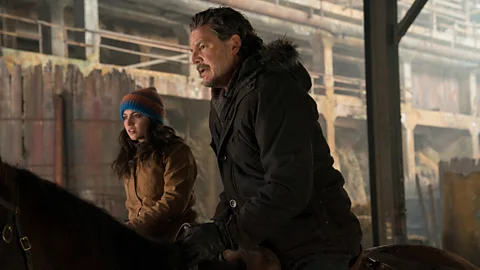The Last of Us season two review: 'The plot twist tears the heart out of the series'
 HBO
HBOThe video game adaptation won many plaudits for its grim-but-humane first season. Amidst a semblance of civilisation, the second series is an uneven odyssey.
Despite all the mush-brained infected creatures roaming around, The Last of Us was never really about the zombies. The series' first season worked so well because of the growing bond between lead character Joel and Ellie, the orphaned teenager he was hired to take cross country, who eventually becomes his surrogate daughter.
The zombies added danger, suspense and action, but the show's strength was its deeply felt depiction of how love survives even in a zombie apocalypse, with Joel and Ellie as a newly created family.
Season two takes a drastic plot turn, truly the most jaw-dropping in a hit series I can remember, a twist too stunning to spoil. Unsettling a hit can work brilliantly, as it did when The Bear replaced the first season's sandwich shop with a fine-dining restaurant in its second series. But the big alteration in The Last of Us is a devastating creative choice.
There are still high points and emotional moments. Pedro Pascal still gives a charismatic and wrenching performance as Joel, letting us see both the hardened survivor and the tenderness that has persisted. And Bella Ramsey still sharply defines the strong-willed Ellie. But the plot twist tears the heart out of the series, leaving a diminished version of the great show it once was.
The new season starts out strongly, though, picking up the story five years after it left off. Joel and Ellie are now settled in Jackson, Wyoming and the early episodes there smoothly evoke the feel of an old-time Western. The town is enclosed by fortified walls, and horse-drawn carts walk on the main streets. Citizens on horseback, including Joel and Ellie, patrol the area outside the gates looking for the infected.
Although Ellie lives in the garage of Joel's house, she is furious at him and the show takes its time teasing why. You might think you know. As last season ended he swooped her off an operating table where surgeons might have used her immunity to cure the plague but would certainly have caused her death. (It's a TV drama, not science.) He killed people to escape then lied to her about it. It turns out that's not the entire cause of her anger.
Around them, some captivating actors bring Jackson to life. Joel's loyal brother, Tommy (Gabriel Luna) is more central this season. As Gail, the town's irreverent therapist, Catherine O'Hara delicately balances some mordant lines with Gail's grief over losing her husband. Isabela Merced is especially vibrant as the energetic Dina, who has just broken up with her boyfriend, Jesse (Young Mazino). You can't blame Merced because the writers telegraph Dina's possible romance with Ellie too heavily from the start.
The most thrilling, action-filled set piece comes early too, as hordes of the infected storm the Jackson barricades while townspeople shoot from roofs. But danger also comes from other places. Kaitlyn Dever plays Abby, a merciless new character searching for Joel, vowing revenge for his hospital attack. As in the first season, this one grapples with a society in which killing takes on a different moral meaning and even infected loved ones have to be shot.
Abby is just one of the characters struggling with those questions: when is killing acceptable in this post-apocalyptic world? How do people separate vengeance and justice? That is still a bracing theme.
But the story soon goes awry when it sends Ellie and Dina away from Jackson onto a dangerous road trip. Scene for scene, the zombie attacks can be harrowing. The creatures look disgusting, brains spilling out of their heads as they leap out of the shadows in dark basements. But the attacks come too regularly and predictably now.
And however much you might be rooting for Ellie and Dina to acknowledge their attraction, they spend so much time dodging the infected – as if killing zombies really is the show's point – that their relationship is no match for Joel and Ellie's. A flashback episode that fills in Joel and Ellie's five years between seasons is eloquent, among the best of the new crop. But it also reveals how much the series relies on the dynamic between them.
The audience for The Last of Us has always been split between viewers who know the video game it is based on (a group less likely to be shocked by any twists) and those who don't know or care about that. But the game can't be treated as a sacred text if it's going to work as television, and the first season brilliantly transformed it into a character-driven series.
With its scattershot emotional drama, too often this season feels commonplace, one more show derived from a game that may leave a good part of the audience cold.
★★★☆☆
The Last of Us Season Two is available on HBO from 13 April.
--
If you liked this story, sign up for The Essential List newsletter – a handpicked selection of features, videos and can't-miss news, delivered to your inbox twice a week.
